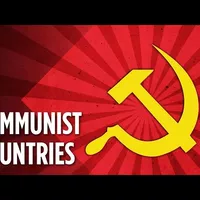These Are The Last Five Communist Countries
Since Russia became the first communist state in 1917, dozens of other countries have converted
their governments to approximate communism.
At one point, during the Cold War, the world was ideologically split between capitalist
and communist political philosophies, but today only about five of these left-leaning
countries remain.
So, what are the world's modern communist states?
Well, an extremely important distinction to make is that “communist states” are not
actually communist, and never have been.
At least, not yet.
Every so-called “communist state” is actually a “socialist state”, under the belief
that socialism is a necessary precursor, and serves a foundation-like purpose in the establishment
of “true communism”.
The difference is relatively complex, but the basic idea is that socialism diverges
from capitalism by giving workers the products of their labor, rather than a single business
owner.
i.e. – distribution according to deeds.
But communism is one step further – once socialism is fully enacted – where goods
are distributed according to need, removing the basic capitalist incentive altogether;
goods distributed according to greed.
No country has successfully bridged that gap.
The USSR, for example, stood for the “Union of Soviet Socialist Republics”, not communist.
Today, the five remaining communist, or communist-like states are China, Cuba, Laos, Vietnam, and
North Korea.
Nearly all former and current communist states are based on single party rule, which is predicated
on Marxism-Leninism or a close derivation.
For example, in China it is referred to as “Maoism”, and in North Korea it is called
“Juche” (joo-che), but the basic economic and political premise is similar to that of
Marxism-Leninism, and developed alongside other communist ideologies.
Interestingly, in 2009, North Korea quietly but deliberately removed any mention of Marxism-Leninism
and Communism from its Constitution.
But communism is marked by more than just a basic political ideology.
Censorship, and cracking down on dissent are also major hallmarks of these remaining countries.
Four of the five, China, Vietnam, Cuba, and North Korea, are ranked among the worst in
the world for press censorship by The Committee to Protect Journalists.
These countries restrict negative publications about the country or its government, and also
monitor their citizens' internet usage.
Economically, communism has also been a mixed bag.
Vietnam and China have been among the fastest growing countries in the world over the past
few decades, however, they've only done so after accepting capitalism into their economies.
Vietnam's first ten years as a communist state were isolationist and stagnant, it was
only after entering the competitive global market and enacting economic reforms that
the country was able to achieve its high growth rate.
Meanwhile, North Korea, Cuba, and Laos have stuck to their isolationist economies, although
until recently Cuba has done so involuntarily, as a result of the US embargo.
Still, all three have seen faltering economies, with North Korea particularly desperate for
international aid, and an estimated GDP of only about $40 billion dollars, which is less
than almost every single US state.
Although the communist ideology has managed to survive the collapse of its initiator,
the USSR, it has only done so in isolation.
The global community has clearly rejected communist states, and those which have been
willing to compromise have seen the greatest success.
Despite the prosperity of countries like China, it appears to be more of an exception to the
rule, than proof of communism as an effective ideology.

